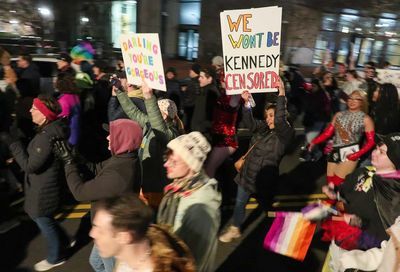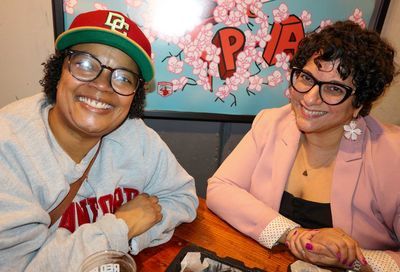Uganda Official Counters Unitarian Minister
Ugandan minister in exile's campaign against homophobia in his home country comes to Maryland, prompting contradictory response from embassy staffer
A Unitarian Ugandan minister in exile, due to reported threats on his life, spoke to a packed Silver Spring church Tuesday night about a proposed Ugandan law to penalize same-sex relations with sentences as severe as execution, and the homophobia that serves as the basis for such laws.
Rev. Mark Kiyimba, of the Unitarian Universalist Church of Kampala, said that homophobia permeates many aspects of Ugandan society and is often fueled by pastors with strong ties to American evangelical leaders.
Yet despite a largely sympathetic audience consisting of LGBT individuals and allies, Kiyimba’s comments did not go unchallenged.
Following Kiyimba’s Jan. 17 presentation, the first person to the microphone identified himself as Dickson Ogwang of the Embassy of Uganda in D.C, which lists Ogwang’s position as ”minister counselor.” Ogwang asked Kiyimba if his life had been threatened and when he thought it would be safe to return to his home country.
Ogwang then used his position at the microphone to make a long speech, beginning by explaining Uganda’s penal code and its roots in English common law – Uganda having once occupied by the British – including the ban on sodomy. Ogwang claimed that over the span of many years during which sodomy was illegal, few prosecutions were carried out. He also suggested that the 2011 murder of prominent Ugandan gay-rights activist David Kato was the result of a romantic relationship gone bad, rather than homophobia.
While members of the audience gasped at Ogwang’s remarks, Kiyimba stood at the pulpit, silent, and let Ogwang speak at length. When Rev. Elizabeth Lerner Maclay, pastor at the venue, the Unitarian Universalist Church of Silver Spring (UUCSS), cut Ogwang off to allow others the opportunity to question Kiyimba, Kiyimba asked Ogwang to lobby other Ugandan government officials for protections for all Ugandans, including LGBT citizens.
Kiyimba also pushed back, however, against Ogwang’s claims and told the audience of punishments handed out to Ugandans who tried to educate radio listeners about the bill or who associated with known homosexuals.
Kiyimba said much of the impetus for the government actions is the rhetoric from homophobic pastors, many of whom receive training or support from American evangelicals who have traveled to Uganda to speak out against homosexuality.
During his presentation, prior to Ogwang’s comments, Kiyimba, the leader of the Unitarian Universalist Church of Kampala, spoke of his opposition to the bill and attempts to combat societal homophobia in his home country.
A longtime supporter of LGBT rights, he said he has encountered fierce opposition for his stance. Kiyimba also presented a short video documentary regarding treatment of homosexuals in Uganda, where same-sex relations are illegal.
The legislation Kiyimba opposes – dubbed the ”kill the gays” bill – has, since its introduction in 2009, disappeared, resurfaced, and disappeared again. While it has yet to become law, it also has yet to be abandoned.
”The life of a gay man or woman is almost an impossible life in Uganda,” Kiyimba said. ”They live in fear, they live in denial, and, most importantly, every hour that goes by, they expect to be attacked.”
Bruce Knotts, the executive director of the Unitarian Universalist United Nations Office, who was in attendance, called Kiyimba a ”hero” for speaking out against anti-gay government actions in his country. Knotts also backed up Kiyimba’s statements while refuting some of the claims made by Ogwang.
Maryland state Sen. Jamie Raskin (D-Montgomery Co.) addressed the crowd after Kiyimba finished taking questions, telling the audience, ”People are waking up to the humanity of our gay and lesbian brothers and sisters.”
Support Metro Weekly’s Journalism
These are challenging times for news organizations. And yet it’s crucial we stay active and provide vital resources and information to both our local readers and the world. So won’t you please take a moment and consider supporting Metro Weekly with a membership? For as little as $5 a month, you can help ensure Metro Weekly magazine and MetroWeekly.com remain free, viable resources as we provide the best, most diverse, culturally-resonant LGBTQ coverage in both the D.C. region and around the world. Memberships come with exclusive perks and discounts, your own personal digital delivery of each week’s magazine (and an archive), access to our Member's Lounge when it launches this fall, and exclusive members-only items like Metro Weekly Membership Mugs and Tote Bags! Check out all our membership levels here and please join us today!


















